Lebanon's two main Shia political parties, Hezbollah and Amal Movement, on Wednesday criticized the composition of a delegation, which is tasked with negotiating a maritime border dispute with Israel later in the day
MOSCOW (Pakistan Point News / Sputnik - 14th October, 2020) Lebanon's two main Shia political parties, Hezbollah and Amal Movement, on Wednesday criticized the composition of a delegation, which is tasked with negotiating a maritime border dispute with Israel later in the day.
In the beginning of October, parliament speaker Nabih Berri revealed a framework agreement, according to which only Lebanese military officers should represent the country during the talks with Israel under the patronage of President Michel Aoun.
On Monday, Beirut named the final team of negotiators, including the head of the delegation, Air Force Brig. Gen. Bassam Yassin; Navy Col. Mazen Basbous; Lebanese Petroleum Administration board member Wissam Chbat; and maritime affairs expert Najib Massihi.
"Hezbollah and Amal movement hereby announce their explicit rejection of what happened and consider that it deviates from the framework agreement, harms Lebanon's stance and supreme interests, transgresses all the nation's strengths, deals a major blow to its role, resistance and Arab position, and represents a surrender to the Israeli logic which aims at reaching any form of normalization," the parties said in a joint statement published by the Hezbollah-linked Al Manar broadcaster.
According to the statement, the parties have called to "immediately" change the delegation in line with the framework agreement.
The long-awaited indirect negotiations are set to be held under the auspices of the United Nations and the US mediators in the southern Lebanese town of Naqoura. The talks seek to resolve an overlap between the two rivaling nations' territorial waters and exclusive economic zones by an area of roughly 330 square miles, which is situated over large oil and gas deposits beneath the Mediterranean seabed.




